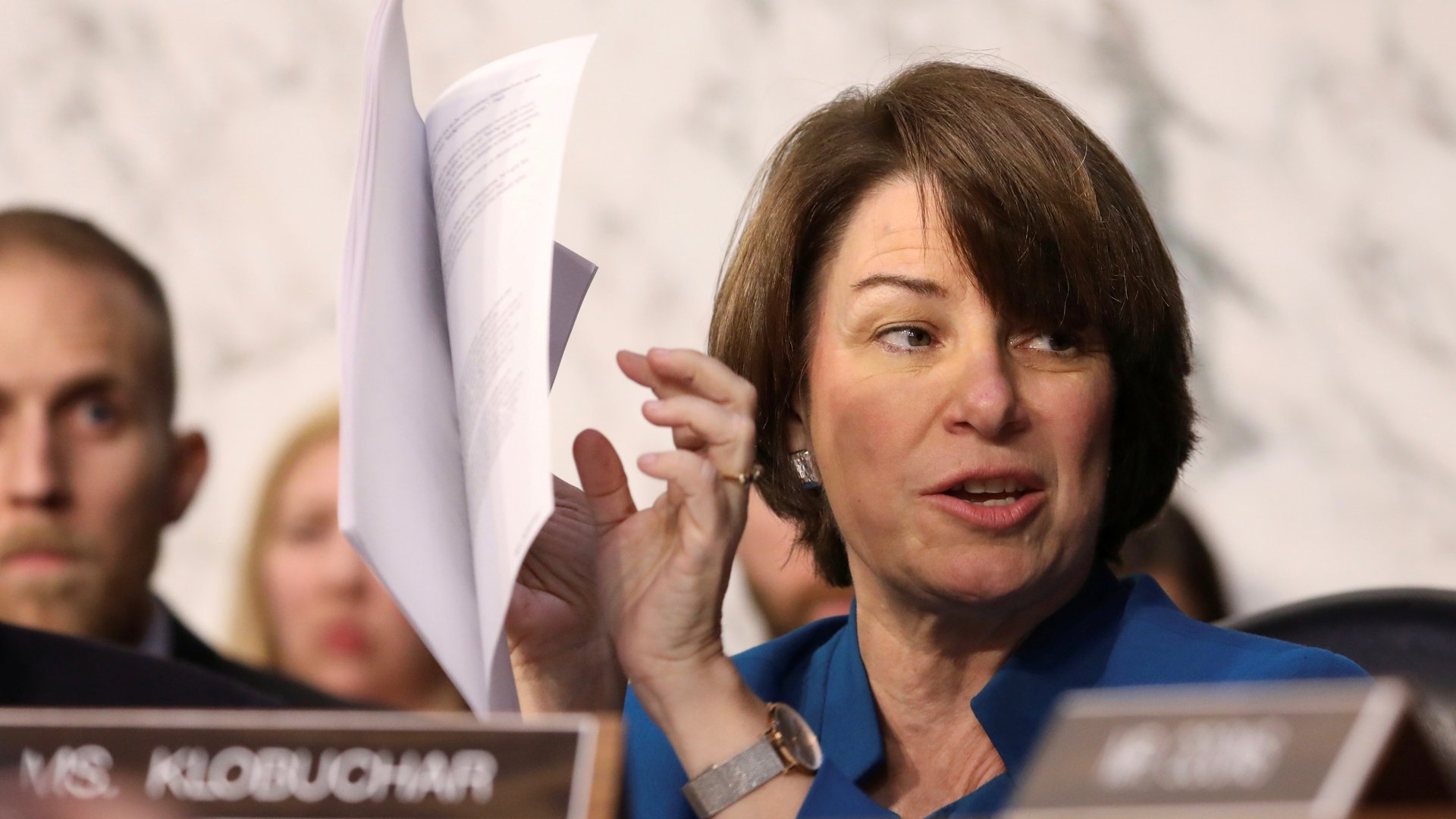Kavanaugh confirmation hearings: “Our democracy is on trial,” says senator Klobuchar
“This is not a normal confirmation hearing,” said Minnesota senator Amy Klobuchar, a Democrat, during Supreme Court nominee Brett Kavanaugh’s confirmation hearing on Sept. 4. “Courts are under assault by the president of the United States…Our democracy is on trial. Our nation’s highest court must serve as a ballast in these turbulent times.”


“This is not a normal confirmation hearing,” said Minnesota senator Amy Klobuchar, a Democrat, during Supreme Court nominee Brett Kavanaugh’s confirmation hearing on Sept. 4. “Courts are under assault by the president of the United States…Our democracy is on trial. Our nation’s highest court must serve as a ballast in these turbulent times.”
Kavanaugh’s hearing, which began today, is proving particularly turbulent. Protestors are vociferously expressing their opinions, and Democrats kicked things off by demanding that the hearing be delayed due to a 42,000-page document dump last night.
“As a former prosecutor, I know that no lawyer goes to court without reviewing the documents,” Klobuchar said, adding that Kavanaugh himself should be opposed to the proceedings. “A good judge would not allow a case to move forward if one side dropped 42,000 pages of documents,” she said. “It’s our duty to speak out.”
Senator Chuck Grassley, chairman of the Senate Judiciary Committee, said his staff was able to review all documents ahead of the hearings, thanks to automated document-review technology—machines that read, basically.
During the hearing, Klobuchar said she believes Donald Trump picked Kavanaugh for the Supreme Court because of one attribute: his expansive view of executive powers. The conservative judge, who served president George W. Bush and investigated president Bill Clinton as part of special prosecutor Kenneth Starr’s investigation, wrote in a 2009 Minnesota Law Review article (pdf) that he sees the president’s role as uniquely difficult and feels the commander-in-chief should be shielded from civil and criminal investigations. “The indictment and trial of a sitting president, moreover, would cripple the federal government, rendering it unable to function with credibility in either the international or domestic arenas,” Kavanaugh wrote. “Such an outcome would ill serve the public interest, especially in times of financial or national security crisis.”
Kavanaugh’s position works out well for Trump, who is under investigation for colluding with the Russian government to influence the 2016 election. Klobuchar warned Tuesday that she would be asking Kavanaugh whether he thinks the president is “above the law.”
The nominee has also expressed the opinion that a president may decide a law is unconstitutional, even when a court has already found otherwise. Klobuchar called this one of many “troubling” aspects of his expansive view of presidential powers, noting that “the rule of kings ended in 1215 with the Magna Carta.”
As a young girl, Kolbuchar didn’t dream of being a lawyer. When she was a teenager, her father took her to watch a day of proceedings in misdemeanor criminal court; she came away understanding that behind every judicial decision is a person and a story.
“All of the attacks on the rule of law and on our justice system in the past year have made me pause and think many times about why I decided to come to this committee…and why I decided to go to law school,” Kolbuchar said on Tuesday. The government and legal system may be imperfect, she told senators, but it is their privilege to help address those imperfections. ”We are at a crossroads,” she said. “Are we going to dedicate ourselves to improving our democracy?”